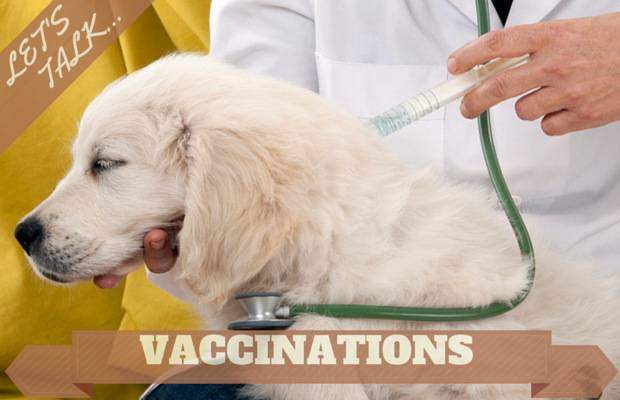Updated: August 9th, 2022

© Depositphotos.com / rugercm
Unlike with adult dogs, a puppy’s immune system is still maturing. While a puppy is nursing, the mother’s milk contains powerful antibodies that protect the pup from disease.
But in the time between adulthood and after a puppy is weaned off mother’s milk, it’s your responsibility to make sure your puppy gets the protection and care they need to have a healthy, long life.
Usually, this means regular vet checkups and puppy vaccinations.
When Should Your Puppy First See The Vet?
If you’ve adopted your puppy from a shelter, you’ll likely not have to worry about vaccinations for a while as the shelter includes vaccinations as part of the adoption process and fee.
That said, it’s worth taking your puppy to the vet for a checkup. If it’s possible, take your puppy to the vet even before you take them home for the first time. This is especially important if you have other dogs or other pets in your household.
If you’re able to request a stool sample from the shelter or the breeder, your vet can analyze it for even more insight into your puppy’s health. Otherwise, you may want to bring a stool sample with you when you first see the vet. Ask your vet to clarify what, if any, samples you should bring with you.
This article is intended as a general guide for puppy vaccinations. If you have any specific questions or concerns relating to your puppy, please consult your licensed veterinarian.
Puppy Vaccination Schedule: When, Why And How Often?
If your puppy is vaccinated for too many diseases at one time, it can overstimulate their immune system, which is why it’s important to have a regular schedule for vaccinations to get the most out of the immunization process.
It may sound counter-intuitive to vaccinate your puppy more times rather than having it done all at once in a combination vaccine, but it pays to be patient: There have been cases when a vaccine suppressed a puppy’s immune system and temporarily put them at risk for other diseases.
Most puppies should be vaccinated starting at 10 weeks old. Until then, the antibodies from mother’s milk are still active. At the age of 3 months or thereabout, you’ll need to have your puppy vaccinated for rabies.
Some vets may recommend annual booster shots. There is significant debate on whether booster shots every year are necessary or if they do more harm than good to the immune system. Speak to your vet and share your concerns about booster shots.
For the latest available, most up to date recommended puppy vaccination schedule, please see:
2011 AAHA Canine Vaccination Guidelines.pdf
If reading and understanding the above PDF seems too great a task (it’s not an easy read!) then please speak to your vet to learn and then follow their advice.
Why Is Vaccinating Your Puppy Important?
Vaccines are meant to keep your puppy from catching a specific disease. Just like children are vaccinated against measles or chicken pox, puppies are vaccinated against rabies, distemper and other common but dangerous diseases.
When your puppy is vaccinated, antigens in the vaccine toggle your puppy’s immune system to produce antibodies that can fight off an infection. This is why vaccinations work: If your puppy gets infected after the vaccine, then he or she can fight it off as the immune system already “knows” that disease.
Protect Your Puppy From These Diseases Through Vaccination
Currently, you can protect your puppy from more than 11 different diseases. By law, you’re only required to vaccinate your dog against rabies. However, if you live in an area where certain diseases are more frequent, then there may be other legal requirements for vaccinations. To be sure you’re complying with local laws, ask your city hall for information.
The American Animal Hospital Association and the American Veterinary Medicine Association both recommend that your puppy be vaccinated against these core (potentially fatal) and non-core (not as deadly) diseases. Your vet will also be able to recommend vaccines that are the most appropriate for your puppy so be sure to ask.
Understanding The Core Vaccinations For Your Puppy
It’s always good to know what’s going on, so here is a quick outline of the core vaccinations for your puppy:
- Rabies is a viral disease that causes the brain to swell. It’s almost always fatal and can be passed from dogs to humans. This is why the rabies vaccine is required by law. Once your puppy has been immunized for rabies, you can expect to bring your dog in for a booster shot once a year or once every three years, depending on local laws.
- Canine Hepatitis/Adenovirus can’t be transmitted to humans but it’s a very serious disease in its own right that infects your dog’s liver and kidneys. Death or chronic kidney problems are the unfortunate results of canine hepatitis.
- Parvovirus is a life-threatening illness that attacks white blood cells. In puppies, parvovirus can damage the heart muscles and cause death or chronic heart problems.
- Canine distemper does not have a known cure. It attacks the spinal cord, the brain and your dog’s breathing and digestive systems. Vaccination has significantly cut down on the spread of canine distemper.
The Non-Core Vaccinations That Are Available For Your Puppy
Below are the diseases that don’t have a high death rate or a high chance of infecting your puppy. Your vet will have more knowledge about your dog and local infections, and should be able to recommend one or more of these vaccinations:
- Lyme Disease can be passed on to dogs from tick bites and typically causes joint inflation, arthritis and lameness. However, Lyme disease can be treated and very rarely causes death in dogs. If you don’t live in a region where ticks are a concern, you probably won’t need to give your puppy the vaccine for Lyme disease.
- Kennel Cough, a mild respiratory tract infection, can be caused by the parainfluenza virus or the bordetella bacterium. If you plan to bring your puppy to dog shows, doggy daycare or boarding kennels, it’s a good idea for them to have this vaccine as kennel cough is highly contagious.
- Coronavirus causes puppy diarrhea. Puppies younger than 12 weeks are at the highest risk for mortality. Older puppies and dogs typically overcome the disease after a few days, so this is not a vaccine that’s often recommended as necessary.
- Giardiasis is caused by the parasite species giardia that lives in the intestine. Dogs usually catch the parasites from one another through infected fecal matter. Giardiasis causes diarrhea but can be treated after it’s been positively identified by your vet. Many other diseases (and even food products) can cause diarrhea so it’s important to get the right diagnosis before starting treatment.
- Measles vaccinations aren’t often recommended and generally given only to puppies between 4 to 10 weeks if they’re at high risk for canine distemper. Distemper is related to the measles virus and is part of the four recommended core vaccinations.
- Leptospirosis is contagious to humans and can be caught from infected water, soil or other animals. Dogs that live on a farm, sporting/hunting dogs and dogs that spent a lot of time in a kennel are the most at risk.
What Are The Risks And Costs Associated With Puppy Vaccinations?
Soreness at the injection site is the most common side effect of vaccinations. But if you do notice changes in behavior, skin rashes, high fever, vomiting or signs of dizziness, call your vet right away.
As to costs, it depends on where you live and the number of vaccines you choose to give your dog. You can expect puppy vaccines to cost around $100 to $200, but remember that responsibly owning a dog means paying for the things that matter.
Found this article helpful? Share with other dog lovers or let us know your thoughts in the comments section below.




4 Comments
emily bennette
Andra, I am so glad that you talked about how you shouldn’t have your puppy get to many vaccinations at once. It seems like it would be a good idea to talk with your veterinarian and schedule enough trips to get your puppy vaccinated in a way that won’t overload their immune systems.
Kenneth Gladman
My wife and I recently recently adopted a black lab puppy. He is so sweet and we need to get him vaccinated here in the coming weeks. I think it is easy to forget that our dogs need vaccines too. It is worth it to keep them safe and healthy!
Judie
We have always vaccinated our Goldens and never had any issues. Recently, our 12 week golden puppy received his 2nd dose of 3, of the DHPP and his 1st nasal spray vaccine for Bordetella.
Within 45 minute he was so swollen in the face, his eyes were closed and mouth/ears/face rock hard.
We rushed him to back to the Vet.
He was treated, and slowly recovered. What options does he have for future vaccinations? We are looking for all options. This was frightening, and all new to us.
Wendy
Hi Judie. This is something you should only ever ask a qualified professional, your vet you have been speaking to. Only a professional who knows the case history could answer this, and any other info you learn from others may be incorrect and potentially harmful. So please only speak to your vet on this matter.